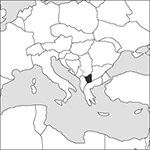
Source: MAPS IN MINUTES™ © RH Publications (1997)
Capital:
Skopje
Area:
25,713 sq km (9928 sq miles)
Population:
2,087,171 (2013 est)
Currency:
1 denar=100 deni
Religions:
Eastern Orthodox 64.7%; Muslim 33.3%; other Christian 0.4%
Ethnic Groups:
Macedonian 64.2%; Albanian 25.2%; Turkish 3.9%; Serb and Roma minorities
Languages:
Macedonian, Albanian (both official); Turkish; minority languages
International Organizations:
UN; OSCE; Council of Europe; Euro-Atlantic Partnership Council; WTO
A landlocked country in the Balkan peninsula bordering Serbia in the north, Albania in the west, Greece in the south, and Bulgaria in the east; formerly a constituent republic of Yugoslavia.
Physical
Most of the republic’s territory is a plateau, from which rise forested mountain peaks.
Economy
Mineral resources include iron ore, lead, zinc, and nickel. The chief crops are fruit, vegetables, and tobacco, with food processing, beverages, and textiles being important industries. Food, beverages, and tobacco are important exports. Macedonia has close economic links with the EU and its currency, the denar, is pegged to the euro.
History
The country comprises part of the area of Macedonia, which was divided in 1913 between Greece and Serbia. The Serbian part of Macedonia was known as southern Serbia from 1918 until 1947, when it became the Republic of Macedonia within the Federal Republic of Yugoslavia, with its own regional Parliament. Following elections in 1990 the anti-Communist Democratic Party was the largest in a hung Parliament. In January 1991 it declared the Republic of Macedonia ‘sovereign and independent’, while not at this stage rejecting membership of a Yugoslav Union of States. The declaration was overwhelmingly supported by a referendum. The country’s independence was recognized by Bulgaria and Turkey, but Greece persuaded the EC to delay recognition, on the grounds that Greek Macedonia was the only region entitled to the name Macedonia. In 1993 Greece agreed to recognize the country on condition that it be known as the Former Yugoslav Republic of Macedonia (FYROM). Negotiations over the name and the use of symbols and emblems continued, and Macedonia agreed in 1995 to change its national flag. Although the issue has not yet been resolved, in the 2000s most of the world’s nations recognized the name ‘Republic of Macedonia’. Discontent within Macedonia’s large Albanian minority flared into armed rebellion in 2001, and a NATO peacekeeping force was deployed. Constitutional changes made concessions to the Albanians.
- logocentrism
- log-odds
- log-off
- logoff
- logomachy
- logon
- log-on transparency
- logos
- log out
- logout
- log paper
- log-periodic antenna
- log phase
- log-rank test
- log-rolling
- logs
- log-series distribution
- LOI
- LOL
- Lola cloth
- Lollard
- Lombard, Peter (1095/1100–1160)
- lomentum
- Lomonosov, Mikhail Vasilievich
- Lomé Convention